Carboplatin Interactions
There are 551 drugs known to interact with carboplatin, along with 5 disease interactions. Of the total drug interactions, 92 are major, 445 are moderate, and 14 are minor.
- View all 551 medications that may interact with carboplatin
- View carboplatin disease interactions (5)
Most frequently checked interactions
View interaction reports for carboplatin and the medicines listed below.
- Alimta (pemetrexed)
- Aloxi (palonosetron)
- Aspirin Low Strength (aspirin)
- Ativan (lorazepam)
- Avastin (bevacizumab)
- Benadryl (diphenhydramine)
- Claritin (loratadine)
- Colace (docusate)
- Compazine (prochlorperazine)
- CoQ10 (ubiquinone)
- Decadron (dexamethasone)
- Eliquis (apixaban)
- Gemzar (gemcitabine)
- Herceptin (trastuzumab)
- Keytruda (pembrolizumab)
- Metoprolol Succinate ER (metoprolol)
- MiraLAX (polyethylene glycol 3350)
- Neulasta (pegfilgrastim)
- Norco (acetaminophen / hydrocodone)
- Pepcid (famotidine)
- Protonix (pantoprazole)
- Synthroid (levothyroxine)
- Taxol (paclitaxel)
- Taxotere (docetaxel)
- Tylenol (acetaminophen)
- Vitamin B12 (cyanocobalamin)
- Vitamin C (ascorbic acid)
- Vitamin D3 (cholecalciferol)
- Zofran (ondansetron)
- Zyrtec (cetirizine)
Carboplatin disease interactions
There are 5 disease interactions with carboplatin which include:
More about carboplatin
- carboplatin consumer information
- Compare alternatives
- Pricing & coupons
- Reviews (5)
- Side effects
- Dosage information
- During pregnancy
- Drug class: alkylating agents
- Breastfeeding
- En español
Related treatment guides
Drug Interaction Classification
| Highly clinically significant. Avoid combinations; the risk of the interaction outweighs the benefit. | |
| Moderately clinically significant. Usually avoid combinations; use it only under special circumstances. | |
| Minimally clinically significant. Minimize risk; assess risk and consider an alternative drug, take steps to circumvent the interaction risk and/or institute a monitoring plan. | |
| No interaction information available. |
See also:
Further information
Always consult your healthcare provider to ensure the information displayed on this page applies to your personal circumstances.


